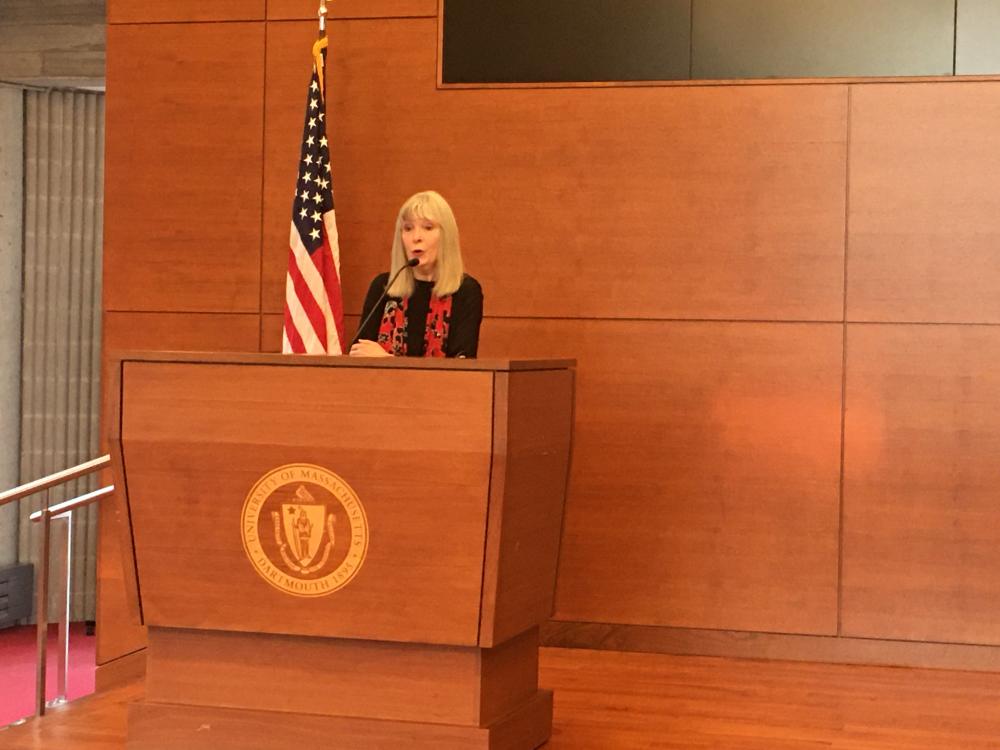Veteran journalist shares her love stories at UMass Dartmouth
Susan Pawlak Seaman shared stories of two of her great loves, her husband Hank Seaman and her 40-year journalism career, during a talk Nov. 16 at UMass Dartmouth.
Sadly, like so many tales of love, both stories ended in loss. In May 2020, she was let go from the Standard-Times.
Months later, her beloved husband died.
But the years before that were filled with exciting experiences and memorable moments, she told the audience at the Claire T. Carney library.
“It went by so fast,’’ the Dartmouth resident said.
Journalists, she said, have the chance to do “so many wonderful things that really make a difference.’’
Her career began unofficially in 1968 when she was a student at Apponequet High School in Lakeville and began writing a regular column about school happenings.
In 1970, she attended Stonehill College, where she planned to study law. During those college years, she spent summers and semester breaks working in the Standard-Times Middleboro as a clerk.
“I just kept coming back and back,’’ she said.
By her junior year, a lifelong romance was ignited. “I fell in love with journalism,’’ she said, and abandoned her plans for law school.
When she graduated in 1974, full-time jobs were hard to find, she said. She returned to the Middleboro bureau, in the same clerk’s position she had held before, but also managed to do some reporting.
At that time, a reporter, Fran Wiksten, began mentoring her, taking her under her wing and giving her guidance.
Then one day, Wiksten, who was in her early 60s, went to bed and never woke up.
“It was a terrible loss,’’ she said.
Soon after, in February 1975, Pawlak Seaman was asked to take the full-time position.
For four years, she worked in the Middleboro bureau, covering everything from Town Meeting to police and fire. “I had to learn everything,’’ she said. “It was a wonderful training ground.’’
The veteran journalist recalled days, long before cell phones, when reporters carried change to make calls on phone booths. They would call editors with their stories, dictating them on the fly.
She started on a manual typewriter, which she used until computers, originally nearly the size of a room
“Now you can video stuff and call anywhere you can get a signal,’’ which she said is pretty much everywhere.
In 1979, she was hired as a city reporter, then eventually became an editor, rising up the ranks to her final post as night editor. She also wrote a popular weekly column.
The newsroom in those days was a “family atmosphere.’’ Colleagues would develop “a real strong connection.’’
Journalism doesn’t pay huge salaries but it offered her the chance to make connections. “Reporting is about the people,’’ she said. “The best way to tell a story is through the public, to make it real.’’
One person she met during her journalism career changed her life forever.
The encounter happened after work at Burt’s, a popular watering hole on Union Street in New Bedford. She and her colleagues popped in often, enjoying a drink and meeting movers and shakers of the community who also frequented the bar.
“It was a good place for cultivating sources and drinking,’’ she said, adding with a laugh, “we did a lot of both.’’
One night, she cultivated a lifelong romance when she met Hank Seaman, a photographer at the paper. She had vowed to stay single until she was 30 and to concentrate instead on her career
Meeting Hank changed everything. “I knew from the get-go it was not going to be a dull ride,’’ she said,
They married Oct. 28, 1978 and formed a strong team. “We really were each other’s strongest critics and best editors,’’ she said.
But in 2004, he suffered a significant stroke and was permanently disabled. Through the years, he faced frequent health challenges.
Then came 2020.
On May 1, Pawlak Seaman was let go from the Standard-Times. Corporate administrators from Gannett, which owned the paper, decided to cut all night editors at their papers.
“Did it end abruptly? Yeah, it did, honestly,’’ she said.
The job loss, although jolting, provided one blessing: She was able to spend more time with her husband during what turned out to be the final months of his life.
After a years-long, valiant health fight, Hank Seaman died Oct. 31, 2020.
But he’s not really gone, Pawlak Seaman said.
“He’s still with me,’’ she said.
Now she looks ahead to a new life, uncertain of the specifics of her future.
But she is sure of one thing: The corporate takeover of much of American journalism does a huge disservice to its readers, and to the public that counts on the press to keep public officials honest.
She cited New Bedford Light and Dartmouth Week as examples of independent journalism in the area doing important work.
But in general, she said, “community journalism isn’t the same. It’s very hard to watch.’’













